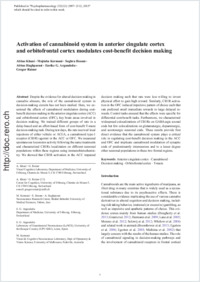Activation of cannabinoid system in anterior cingulate cortex and orbitofrontal cortex modulates cost-benefit decision making
- Khani, Abbas Visual Cognition Laboratory, Department of Medicine, University of Fribourg, Switzerland - Center for Cognition, University of Fribourg, Switzerland
- Kermani, Mojtaba Neuroscience Research Center, Shahid Beheshti University of Medical Sciences, Tehran, Iran
- Hesam, Soghra Neuroscience Research Center, Shahid Beheshti University of Medical Sciences, Tehran, Iran
- Haghparast, Abbas Neuroscience Research Center, Shahid Beheshti University of Medical Sciences, Tehran, Iran
- Argandoña, Enrike G. Department of Medicine, University of Fribourg, Switzerland
- Rainer, Gregor Visual Cognition Laboratory, Department of Medicine, University of Fribourg, Switzerland
-
23.12.2014
Published in:
- Psychopharmacology. - 2015, vol. 232, no. 12, p. 2097–2112
English
Despite the evidence for altered decision making in cannabis abusers, the role of the cannabinoid system in decision-making circuits has not been studied. Here, we examined the effects of cannabinoid modulation during cost-benefit decision making in the anterior cingulate cortex (ACC) and orbitofrontal cortex (OFC), key brain areas involved in decision making. We trained different groups of rats in a delay-based and an effort-based form of cost-benefit T-maze decision-making task. During test days, the rats received local injections of either vehicle or ACEA, a cannabinoid type-1 receptor (CB1R) agonist in the ACC or OFC. We measured spontaneous locomotor activity following the same treatments and characterized CB1Rs localization on different neuronal populations within these regions using immunohistochemistry. We showed that CB1R activation in the ACC impaired decision making such that rats were less willing to invest physical effort to gain high reward. Similarly, CB1R activation in the OFC induced impulsive pattern of choice such that rats preferred small immediate rewards to large delayed rewards. Control tasks ensured that the effects were specific for differential cost-benefit tasks. Furthermore, we characterized widespread colocalizations of CB1Rs on GABAergic axonal ends but few colocalizations on glutamatergic, dopaminergic, and serotonergic neuronal ends. These results provide first direct evidence that the cannabinoid system plays a critical role in regulating cost-benefit decision making in the ACC and OFC and implicate cannabinoid modulation of synaptic ends of predominantly interneurons and to a lesser degree other neuronal populations in these two frontal regions.
- Faculty
- Faculté des sciences et de médecine
- Department
- Département de Médecine
- Language
-
- English
- Classification
- Biological sciences
- License
-
License undefined
- Identifiers
-
- RERO DOC 257285
- DOI 10.1007/s00213-014-3841-6
- Persistent URL
- https://folia.unifr.ch/unifr/documents/304513
Statistics
Document views: 103
File downloads:
- pdf: 280
